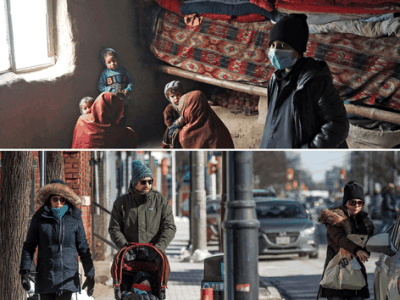I think it was Algonquin park
It was so cold and winter dark
A promised hibernation high
Took me across the great black plate of ice
From “The Bear”
—The Tragically Hip
In the weeks leading up to the final Tragically Hip concert, I’d been reading the band’s lyrics, watching the frontman, Gord, on video doing his weird salsa dances, wiping his face with a hanky, singing about Thompson, Saskatoon, Kingston and New Orleans. On the day of the last concert, we were travelling to south-western Ontario. All day long, every radio station played the Hip. As we drove through Kingston, it was “Tragically Hip Day” with 27,000 people celebrating the band at the stadium, in the parks and on the streets of their hometown.
Gord was reminding me how I once thought my country was that place just outside of here, where wind lifts up the waves on Lake Ontario and on Huron, the freshwater sea. How we live along the north’s southern edge, with Canada geese, deer, coyotes, chickadees, and pelicans that fly overhead like an air force squadron in a prairie summer sky. Even the groundhogs and squirrels seem freer just north of here—two hours north of Ottawa, four hours north of Toronto, 20 minutes north of Regina.
I used to think this country could be as soft and sweet as young bluebirds learning to fly in open fields, dipped in the colour of azure sky. I thought it was about us helping each other survive on the edge of land we settlers mostly can’t live on, where we would not set out alone but always with a friend to keep each other safe—self-reliance being an illusion in vast, cold places.
Then I started to see fewer stars and more satellites up above, fewer horizons and more steel transmission towers marching in lockstep into the cities, more highways with line after line of cars. Our country was under the power of a pinched, stodgy and secretive government, casting a grey pall.
There is cold, still air at the tops of pines and firs rising up along Highway 7, north to Peterborough and Highway 60 up to Killaloe. There are deep-dark green and blue lakes. But what about the shacks that pass for houses in those little towns? No one driving through can figure out how you’d make a living. For us city dwellers, these towns among the wild, open spaces represent our dreams—of living differently, leaving behind traffic and the grind of work, day after day. But maybe there, the wind that feels so fresh to us is nothing special. The pines and firs not worth thinking about. The wild strawberries for the birds. Maybe in a quiet little town north of here, you’d be looking for a signal from the shiny cities, a new transmission and current of life.
This country was meant to provide food and furs to the Empire, which sent off its traders and factors; merchants and soldiers for that purpose. Behind them came refugees, indentured servants, slaves and immigrants from eastern and western Europe, Asia and Africa. Is that our heritage? Along with beaver pelts and fish? Timber and diamonds; uranium and oil?
What about a cold stillness that hovers above the highest branches of a crooked jack pine? Or the feeling of washing away from shore in a freshwater sea nobody can see the end of?
What about Mi’kmaq, Innu, Haudenosaunee—league of six nations? Algonquins, Saulteaux, Dakota, Siksika, Dene, Haisla, Heiltsuk, Haida, Tlingit, Nlaka’pamux, and on and on? They have always been here. Since before Columbus and Cartier, and the shiploads of people searching for a home, people who mistook the land for an empty place. People who saw fields for growing wheat and potatoes instead of for hunting and fishing or for gathering medicines. People wanting fences and roads, deeds for their land, cows, pigs and sheep. Not buffalo or even Canada geese.
I used to admire the idea of Canada. Not the constitution, smug multiculturalism or nice houses and safe streets for fortunate ones. But what’s here, on the edge of things, just below where the north begins.
Gord travelled along this way, living each day, as best he could, as an adventure, travelled between the towns and cities strung like pearls along the country’s border. He happened upon wonder in roadside motels, dug up miracles hidden in shells on the shores of Lake Ontario. I think of Gord and I’m reminded of the Canada I used to love. It reappeared after a long absence: a place that listened to the Hip all day, where 11 million people tuned into a concert.
In fall, my son and I walk our dog on the street at dusk and, looking up, we see thousands of bats beginning their night travels. We hear their wings whisper, their dark singing flight, never knowing where they go or how they come back.
Perhaps Gord didn’t know what Canada is any more than I do. He wrote about it anyway and found himself on a ferry covered in ice in the Atlantic Ocean, somewhere between Nova Scotia and Newfoundland. He held hands with the girl from Thompson, Manitoba—she was so rosy-cheeked with her hair flying under the edges of her toque. He met polar bears, black bears and black ice; black and white checkerboard floors; one-third of his country singing for him in darkened halls, taverns and city streets on a Saturday night.
The adventure is touching the icy border where it all begins, feeling cold air come down from the roof of the forest. The adventure is driving to unexpected places, where little towns are falling apart and no one can figure it out, how do they survive up here? What do they hear in the wind?
August 26, 2016
Ottawa, Ontario











